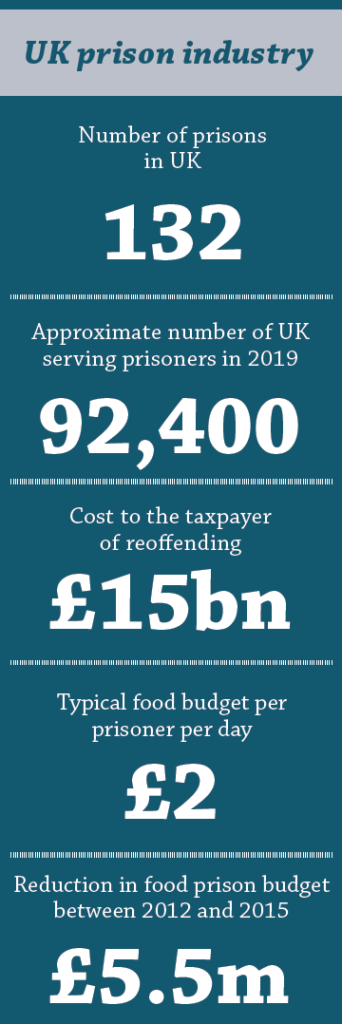The prison sector offers a complicated, yet potentially rewarding opportunity to wholesalers. Helena Drakakis investigates.
The UK’s prison estate may not offer the largest public- sector contracts for food wholesalers, but given the security requirements and mix in age and ethnicity of those serving time, it is one of the most challenging.
Wholesalers looking to work with prisons will find themselves on a steep learning curve, but ultimately, it can be a rewarding journey.
Tailor to needs
With approximately 92,400 inmates currently in UK prisons, foodservice operators must cater for a wide variety of people and circumstances. According to Bidfood, which operates the largest contract with the Ministry of Justice (MoJ) across England and Wales, every prison is different.
“Every establishment has unique catering requirements depending on the religious, cultural and medical needs of the prisoners,” says corporate client director Carole Hainsworth. “Delivery-wise, each prison has different accessibility protocols and processes, requiring a selection of different vehicles to deliver effectively.”
Read more: What opportunities does the healthcare sector present to wholesalers?
Bidfood supplies categories including frozen, ambient, chilled and fresh produce to the prison estate to cover mealtimes, with prisoners able to order snacks and drinks through the prison catalogue.
 In Scotland, where JW Filshill manages a £4.4m contract covering 15 prisons, the catalogue has been enhanced through regular meetings with the Scottish Prison Service (SPS). Filshill’s key account manager, Sandra Morris, identified a need among non-English speaking prisoners and those unable to read.
In Scotland, where JW Filshill manages a £4.4m contract covering 15 prisons, the catalogue has been enhanced through regular meetings with the Scottish Prison Service (SPS). Filshill’s key account manager, Sandra Morris, identified a need among non-English speaking prisoners and those unable to read.
“Alongside the SPS, I developed a product catalogue for prisoners, complete with images of soft drinks, groceries, vaping products and toiletries,” she says, adding that the range is rationalised to include new product development, remove slower sellers and to introduce products that sell well with Filshill’s retail base every three months.
Add value
A couple of years ago, Morris also worked with Filshill’s buyers and the SPS to offer a range of toiletries that prison staff were previously sourcing from high-street retailers, such as Boots, thereby enhancing Filshill’s sales and saving the prison service money.
Again, her work also came to fruition in November 2018 when the SPS banned tobacco throughout the estate. Morris did much of the liaison work between Edinburgh-based e-cigarette supplier Jac Vapour, which won the primary contract to supply prison-compliant e-cigarettes throughout the Scottish estate.
The ranges are now in place and working well, and both Filshill and SPS have recently worked together to source alternative ranges, for example, new disposable e-cigarettes that were introduced in late 2019.
The extra legwork done by the wholesaler has been praised by Jac Vapour. “Filshill took a leadership role to deliver. This involved it working tirelessly between Jac and the SPS to resolve outstanding technical issues,” says Jac’s Neil McCallum.
Nutrition matters
Prison budgets have decreased over the past few years, leaving catering managers with an average of £2 to feed each person for three meals a day.
While companies like Bidfood work with the MoJ to develop and update menus, and hold Commodity Appraisal Panels to showcase new products and recipe ideas that meet the MoJ’s specifications and nutritional requirements, one campaign believes more can be done to improve prison food.
Lucy Vincent, who runs Food Behind Bars, points to a 2016 HM Inspectorate of Prisons report into prison food, which highlights research linking prisoners’ eating a nutritionally balanced diet to a reduction in disciplinary incidents, aggression and violent behaviour.
“Many caterers in prisons are great at cooking for 700 people, but this often means the food on offer can be bland and unimaginative,” she says. “Key to what we are doing is educating prisoners on healthy eating, which I also see as a key part of rehabilitation.
“Prison food, on the whole, doesn’t contain enough fresh fruit and vegetables. It’s high in carbohydrates and portion sizes are often inadequate.” She adds that menus should offer a greater variety.
Providing employment
Above and beyond supplying food and advice to prison catering staff, Bidfood has also worked in partnership with the MoJ to support it in the rehabilitation of prisoners.
“Bidfood has been engaged in the release on temporary licence (ROTL) programmes, kicking off the programme at our Paddock Wood depot more than 11 years ago, explains Hainsworth. “Prisoners who are considered suitable for available roles are put forward through the scheme in the last year of their sentence, as part of their rehabilitation and reintegration process, and go through the usual interview process.”
The scheme supports prisoner’s integration back into every day society, and gives them work experience to take with them on their release from prison. The jobs are full-time, and they travel to and from the prison every day.
“The scheme has been a great success, and we have seen so many prisoners integrate really well into their roles, with some becoming full-time employees after their release – in fact, two have achieved long-service awards,” she adds.
Read more: A lot to be learned: Exploring the education sector








